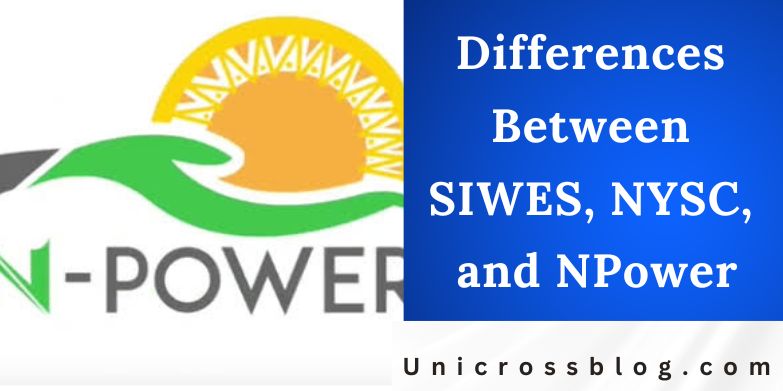In Nigeria, programs like the Students Industrial Work Experience Scheme (SIWES), National Youth Service Corps (NYSC), and NPower are pivotal in addressing youth development, skill acquisition, and national integration. Each program serves distinct purposes, targeting different groups and offering unique benefits. Understanding their differences is essential for students, graduates, and young professionals navigating opportunities for growth and career development.
This article explores the objectives, eligibility, duration, benefits, and operational frameworks of SIWES, NYSC, and NPower, providing a clear comparison to help individuals make informed decisions about participation.

Overview of SIWES
The Students Industrial Work Experience Scheme (SIWES), initiated in 1973 by the Industrial Training Fund (ITF), bridges the gap between academic theory and practical application. It targets students in tertiary institutions, particularly those in engineering, science, technology, agriculture, and related fields. SIWES provides hands-on experience in real-world work environments, enhancing students’ technical and professional skills.
-
Eligibility: SIWES is for students in universities, polytechnics, colleges of technology, agriculture, and education, typically in their second, third, or fourth year, depending on the institution and program.
-
Duration: The program lasts 4–6 months, with polytechnic students typically undertaking a 4-month SIWES after National Diploma (ND) Year 1, while university students often participate for 6 months at the 300, 400, or 500 level.
-
Structure: Students are placed in industries relevant to their field of study, supervised by both industry-based and institutional supervisors. They maintain logbooks to record activities and submit reports for assessment. The ITF, in collaboration with the National Universities Commission (NUC) and other bodies, oversees the program.
-
Benefits: SIWES offers practical exposure, skill development (e.g., problem-solving, teamwork), and networking opportunities. Some students receive stipends from the ITF, though this is limited to specific programs like Computer Science, Agricultural Sciences, and Business Education. It enhances employability, with 91.2% of employers preferring candidates with work experience, according to the National Association of Colleges and Employers.
Overview of NYSC
The National Youth Service Corps (NYSC), established in 1973 by the Yakubu Gowon administration, promotes national unity and youth development. It requires graduates to serve the nation for one year, often in states other than their own, to foster cultural integration and contribute to community development.
-
Eligibility: NYSC is mandatory for Nigerian graduates under 30 years old with a degree or Higher National Diploma (HND) from accredited institutions, including those who studied abroad but are Nigerian citizens.
-
Duration: The program spans 12 months, starting with a 3-week orientation camp, followed by primary assignments in sectors like education, health, or agriculture, and concluding with community development service (CDS).
-
Structure: Participants, known as corps members, are deployed to states for primary assignments at places of primary assignment (PPAs), such as schools or government offices. The program includes revalidation (for those who miss orientation after deployment) and remobilization (for those who abscond or pause service).
-
Benefits: NYSC provides a monthly stipend, work experience, and opportunities for cultural exchange. The Skills Acquisition and Entrepreneurship Development (SAED) program within NYSC equips corps members with entrepreneurial skills to combat unemployment, which affects 40% of Nigerian graduates.
Overview of NPower
NPower, launched in 2016 as part of the National Social Investment Programme (NSIP), addresses youth unemployment by providing skills training and job opportunities. It targets both graduates and non-graduates, focusing on empowerment through vocational and technical training.
-
Eligibility: NPower is open to Nigerians aged 18–35, including graduates (for programs like N-Teach, N-Health, N-Agro) and non-graduates (for N-Tech, N-Build). Applicants must provide personal and educational details via the NASIMS portal, including biometric verification.
-
Duration: Program duration varies. Graduate programs typically last 6–12 months, while non-graduate programs, like N-Tech, include 3 months of in-camp training and 7 months of attachment, totaling 10 months.
-
Structure: NPower operates through categories like N-Teach, N-Health, N-Agro (for graduates), and N-Tech, N-Build (for non-graduates). Beneficiaries receive training, tools, and stipends (e.g., N10,000 monthly for non-graduate programs). The program emphasizes community development and skill acquisition.
-
Benefits: NPower offers stipends, vocational training, and tools for entrepreneurship. It prepares participants for job markets or self-employment, with some transitioning to permanent roles or starting businesses.
Key Differences
Purpose:
- SIWES: Focuses on bridging academic theory with practical industry experience for students.
- NYSC: Promotes national unity, cultural integration, and community development for graduates.
- NPower: Targets unemployment through skill acquisition and empowerment for both graduates and non-graduates.
Target Audience:
- SIWES: Tertiary institution students in specific fields.
- NYSC: Graduates with degrees or HNDs under 30 years.
- NPower: Youth aged 18–35, including graduates and non-graduates.
Duration:
- SIWES: 4–6 months.
- NYSC: 12 months.
- NPower: 6–12 months, depending on the program.
Compulsory Nature:
- SIWES: Mandatory for relevant academic programs.
- NYSC: Mandatory for eligible graduates.
- NPower: Voluntary, based on application and selection.
Funding and Stipends:
- SIWES: Limited stipends from ITF for specific programs.
- NYSC: Monthly stipends from the federal government.
- NPower: Monthly stipends (e.g., N10,000 for non-graduates) and tools.
Outcome:
- SIWES: Enhances academic performance and employability through industry experience.
- NYSC: Provides work experience, cultural exposure, and entrepreneurial skills.
- NPower: Equips participants with vocational skills for employment or entrepreneurship.
Similarities
-
All three are federal government initiatives aimed at youth development.
-
They provide practical experience to prepare participants for future careers.
-
Each involves community development, either directly (NYSC, NPower) or indirectly (SIWES through skill application).
-
They aim to address unemployment by equipping participants with skills.
READ ALSO: Best Government Youth Programs in Nigeria in 2025
FAQs
Can someone participate in all three programs?
Yes, but at different stages. SIWES is for students during their studies, NYSC is for graduates post-study, and NPower is open to eligible youth, including those who have completed NYSC or are non-graduates.
Is payment guaranteed in these programs?
SIWES offers stipends for specific programs, but not all. NYSC provides a consistent monthly stipend. NPower provides stipends and sometimes tools, but amounts vary by program category.
Are these programs mandatory?
SIWES and NYSC are mandatory for eligible students and graduates, respectively. NPower is voluntary, requiring application and selection.
How do these programs impact employability?
SIWES enhances technical skills, NYSC provides professional experience and networking, and NPower equips participants with vocational skills, all improving job prospects.
Can foreign-trained graduates participate in SIWES or NPower?
Foreign-trained students can participate in SIWES if enrolled in Nigerian institutions. NPower is open to all Nigerians aged 18–35, including foreign-trained graduates, but NYSC is mandatory for foreign-trained Nigerian graduates under 30.







